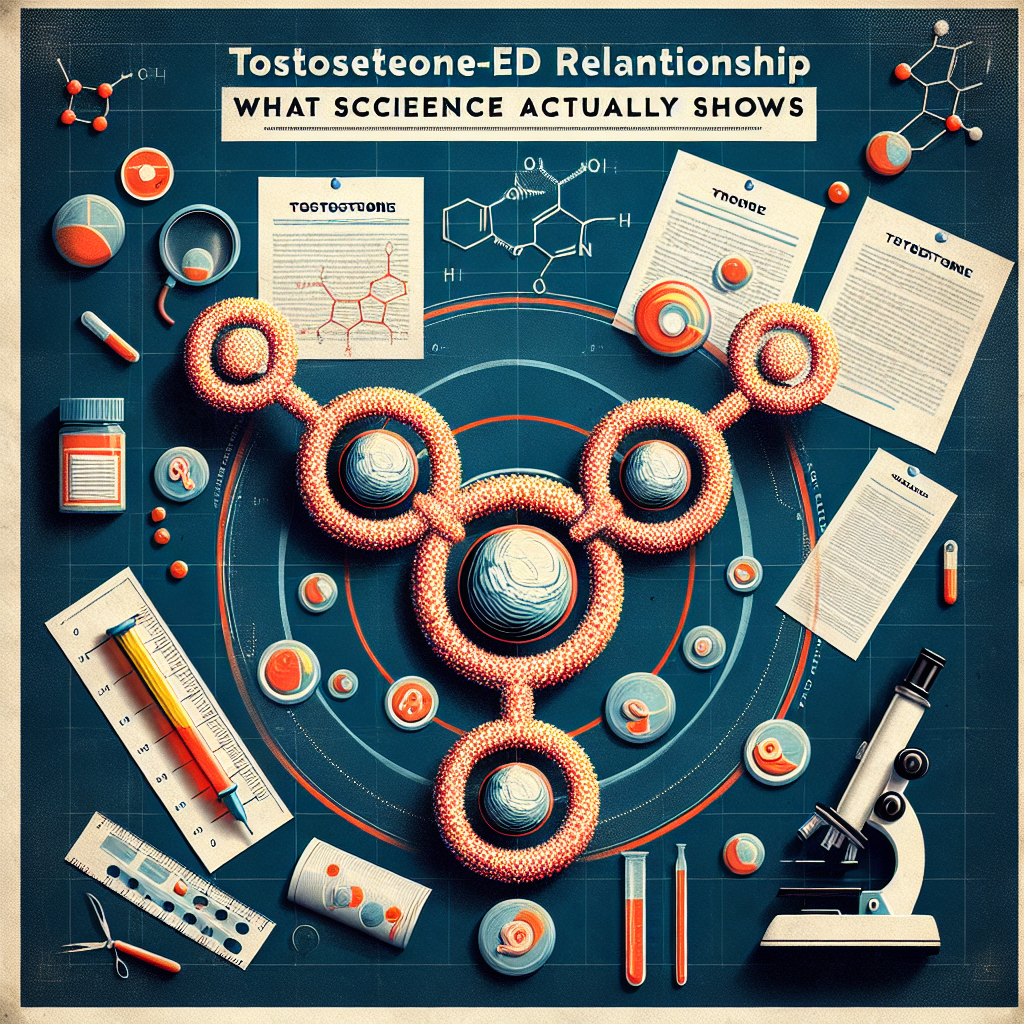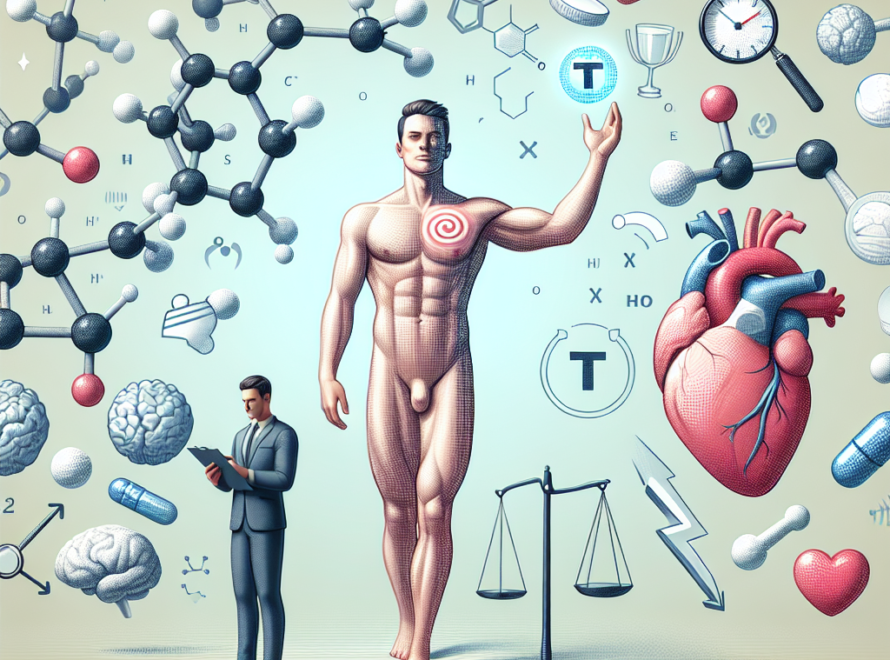Understanding the Link Between Testosterone and Erectile Dysfunction
Erectile dysfunction (ED) affects more than 30 million men in the United States, according to the National Institute of Diabetes and Digestive and Kidney Diseases. This condition can lead to emotional distress, strained relationships, and diminished self-esteem. Among the most frequently asked questions is whether low testosterone levels are responsible for ED.
Although there is a connection between testosterone and erectile function, the relationship isn’t always straightforward. Here’s what the latest medical research reveals about this complex interplay—and how you can manage it.
The Role of Testosterone in Men’s Sexual and Overall Health
Testosterone is the primary male sex hormone, responsible for a wide range of bodily functions. It supports:
– Sexual desire (libido)
– Muscle and bone strength
– Fat distribution
– Sperm production
– Energy and mood regulation
Mainly produced in the testicles, testosterone levels peak during adolescence and early adulthood. After age 30, levels typically decline by about 1% each year. While this decline is natural, not all men will experience noticeable symptoms.
“Testosterone’s direct impact on erections is often misunderstood,” says Dr. Michael Eisenberg, a urologist and director of men’s health at Stanford University. “While it fuels desire, it doesn’t operate the plumbing system. That’s managed by blood vessels and nerves.”
Although low testosterone—also called hypogonadism—can reduce libido and impact mood, its role in achieving an erection is generally indirect.
Unpacking the Real Causes of Erectile Dysfunction
Erectile dysfunction is defined as the consistent inability to achieve or maintain an erection suitable for sexual activity. It typically arises from a combination of psychological and physical factors. Some of the most common physical causes include:
– Cardiovascular disease
– Type 2 diabetes
– Obesity
– High blood pressure
– Smoking or substance abuse
– Certain medications, such as SSRIs and antihypertensives
Psychological factors—such as stress, anxiety, and depression—can also be major contributors. According to the Cleveland Clinic, up to 20% of ED cases, particularly in younger men, stem from mental health concerns.
While low testosterone levels can influence ED, they’re rarely the only cause. Identifying and addressing the root causes is key to effective treatment.
What Research Says About Low Testosterone and ED
Does low testosterone directly cause erectile dysfunction? Not necessarily—but it can aggravate it.
A meta-analysis published in The Journal of Clinical Endocrinology & Metabolism found that men with low testosterone are more likely to report reduced libido and poorer erectile performance. However, this relationship isn’t always predictable.
“Low testosterone tends to affect a man’s interest in sex more than his ability to perform,” notes Dr. Abraham Morgentaler, a testosterone researcher at Harvard Medical School. “Some men with very low levels still function sexually, while others with normal levels experience dysfunction.”
This reveals that sexual performance is influenced by more than just hormone levels. Other key takeaways include:
– Men with low testosterone can still have normal erections
– Men with ED can have normal testosterone levels
These inconsistencies demonstrate the multifactorial nature of ED and the importance of a complete medical assessment.
What Testosterone Replacement Therapy Can—and Can’t—Do
For men diagnosed with clinically low testosterone levels, testosterone replacement therapy (TRT) may be a treatment option. TRT is available in several delivery formats, including:
– Topical gels and skin patches
– Intramuscular injections
– Subcutaneous pellets
According to the American Urological Association, TRT can enhance energy levels, mood, libido, and bone density in individuals with confirmed testosterone deficiency.
However, its impact on erectile function is variable. Some men see moderate improvements in their erections—especially when their ED is directly linked to low testosterone levels.
It’s important to understand that TRT is not a universal remedy. Those whose ED is related to vascular issues, nerve damage, or psychological challenges may not benefit significantly from hormonal therapy alone.
Men can also explore prescription options like sildenafil (Viagra) or tadalafil (Cialis), available through trusted online providers. These medications work by improving blood flow and have a more direct impact on erection quality.
TRT requires consistent use over weeks or months, and medical supervision is essential to monitor for side effects such as increased red blood cell count, changes in cholesterol levels, reduced fertility, and potential prostate complications.
When to Test Your Testosterone Levels
If you’re experiencing persistent symptoms such as:
– Persistent fatigue and low energy
– Reduced interest in sexual activity
– Mood swings, irritability, or depression
– Loss of muscle mass or increased fat
– Difficulty achieving or maintaining erections
It may be time to check your testosterone levels.
Doctors generally recommend testing early in the morning, between 7 and 10 AM, when testosterone levels are naturally at their peak. Two separate blood tests are often needed to confirm low testosterone.
While normal total testosterone ranges from 300 to 1,000 ng/dL, symptom patterns matter just as much as lab results in determining proper treatment.
Beyond Hormonal Therapy: Holistic Strategies to Manage ED
Even with low testosterone, many healthcare experts recommend starting with lifestyle changes that benefit both sexual and overall health. Here are several proven strategies:
– Engage in regular aerobic exercise like walking, swimming, or cycling to improve blood flow and support hormone production
– Adopt a heart-healthy diet, such as the Mediterranean diet, rich in fruits, vegetables, fish, and whole grains
– Manage stress through counseling, mindfulness, or other relaxation techniques
– Quit smoking to enhance circulation and overall health
– Prioritize quality sleep to promote hormonal health and sexual function
These approaches not only aid in improving sexual performance, but also support cardiovascular, metabolic, and mental well-being.
A helpful tip: keep a journal to track your symptoms, daily habits, and progress. This can be a valuable tool for identifying patterns and guiding conversations with your healthcare provider.
The Key Takeaway on Testosterone and ED
While testosterone plays a critical role in sexual desire and emotional health, it’s rarely the sole cause of erectile dysfunction. Many men with low testosterone maintain normal erectile function, while men with ED may have hormone levels within the normal range.
When testosterone deficiency is confirmed alongside ED, testosterone replacement therapy may offer benefits—especially when paired with medication or lifestyle changes.
The most effective approach is a comprehensive one, examining hormonal levels, psychological health, lifestyle habits, and existing medical conditions. Consulting a qualified men’s health specialist is the best step toward restoring not just sexual health, but overall confidence and vitality.
If you’re experiencing concerns with low testosterone or ED, don’t tackle it alone. Speak with a healthcare provider or visit a trusted resource for personalized treatment options. The path to improvement may be simpler and more accessible than you think.
References
– National Institute of Diabetes and Digestive and Kidney Diseases. Erectile Dysfunction (2021). https://www.niddk.nih.gov/health-information/urologic-diseases/erectile-dysfunction
– European Association of Urology. “EAU Guidelines on Sexual and Reproductive Health”
– The Journal of Clinical Endocrinology & Metabolism, 2010;95(6):2536–2549
– American Urological Association. “Guideline on Testosterone Deficiency”
– Mayo Clinic. “Testosterone Therapy: Potential Benefits and Risks As You Age” (2023)
– Harvard Medical School. “Testosterone and Sexual Function in Men: The Evidence” (2022)
– Cleveland Clinic. “Erectile Dysfunction (ED) Causes & Treatments”



